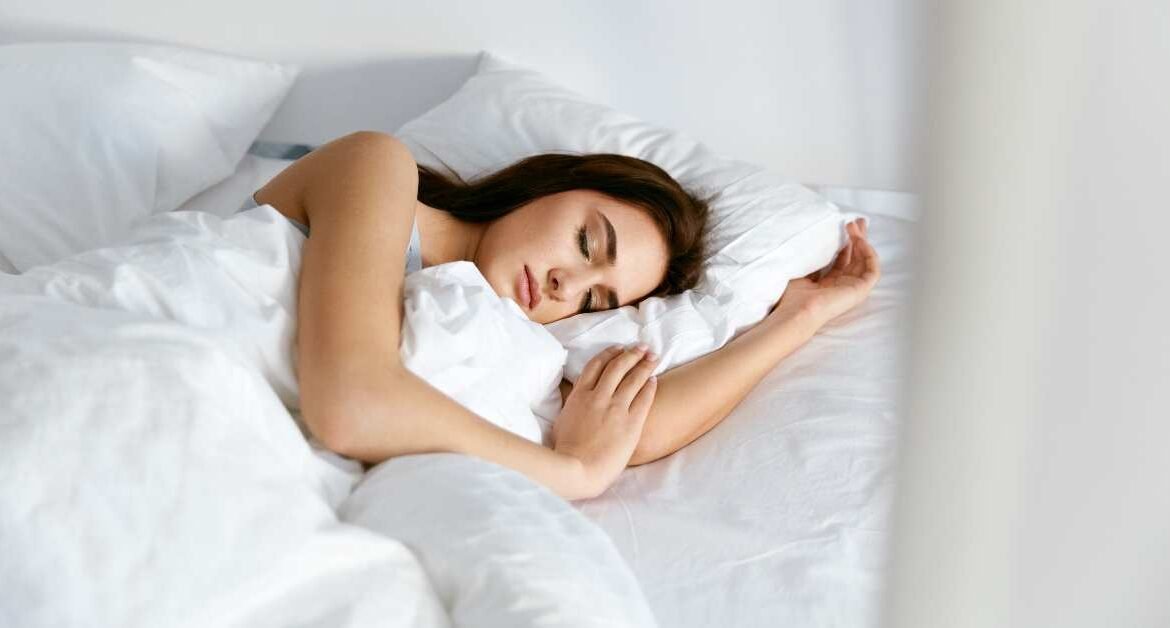The Potential Benefits of CBD for Sleep

The Potential Benefits of CBD for Sleep is an essential component of our daily lives, contributing significantly to our overall well-being and functioning. However, many individuals struggle with sleep disorders, which can have a detrimental impact on their physical and mental health. In recent years, there has been a growing interest in alternative remedies like cannabidiol (CBD) to address sleep-related issues. In this article, we will explore the potential benefits of CBD for sleep and discuss the scientific evidence supporting its use.
CBD has shown potential as a sleep aid. By interacting with the body’s endocannabinoid system, CBD may promote relaxation, reduce anxiety and stress levels, and alleviate symptoms of insomnia or sleep disorders. While research is ongoing, CBD’s safety profile is generally favorable. It is important to consult with a healthcare professional and consider factors such as product quality and dosage when using CBD for sleep and Can CBD help with Sleep
Understanding CBD
Understanding CBD is crucial for anyone interested in the potential therapeutic benefits of this compound. CBD, also known as cannabidiol, is an inherent component derived from the cannabis plant.Unlike THC, another compound in cannabis, CBD does not produce psychoactive effects.
Research suggests that CBD interacts with the body’s endocannabinoid system, which regulates functions like sleep, mood, and appetite. This interaction may contribute to CBD’s reported effects. CBD is known for its potential in managing seizures associated with epilepsy, and an FDA-approved medication called Epidiolex is available for this purpose.
CBD has also been studied for its possible effects on anxiety, sleep disorders, inflammation, and pain relief. It may help reduce anxiety symptoms and improve sleep quality, and its interaction with pain and inflammation receptors holds promise for chronic pain conditions. However, further research is needed to confirm these effects and establish optimal dosages and delivery methods.
Regulations on CBD products vary by country and jurisdiction, and consumers should exercise caution. Consulting healthcare professionals is advisable, especially for those taking medications or having underlying health conditions.
While CBD for Sleep shows promise, more research is needed to fully understand its effects, safety, and best uses. Personalized advice from healthcare professionals is always recommended for CBD or any other supplements or medications.
The Science Behind Sleep
“The Science Behind Sleep” explores the fascinating realm of sleep from a scientific perspective. Sleep is a vital physiological process that allows our bodies and minds to recharge and restore. Extensive research has uncovered the complex mechanisms and stages of.
Scientists have discovered that CBD for Sleep is regulated by an intricate interplay of neurotransmitters, hormones, and brain activity. The sleep-wake cycle is governed by the body’s internal clock, known as the circadian rhythm, which helps align our sleep patterns with the natural light-dark cycles of the day.
Sleep is divided into several distinct stages, including non-rapid eye movement (NREM) sleep and rapid eye movement (REM) CBD for Sleep. NREM sleep is further divided into four stages, each with unique characteristics and functions. REM CBD for Sleep is the stage associated with vivid dreams and heightened brain activity.
During CBD for Sleep, the body undergoes crucial restorative processes. Sleep plays a vital role in memory consolidation, learning, and cognitive function. It also contributes to immune system regulation, hormone production, and tissue repair. Insufficient or poor-quality sleep can have detrimental effects on overall health and well-being.
Various factors can influence sleep quality and duration, including lifestyle habits, environmental conditions, and individual differences. Understanding the science behind sleep can help individuals make informed decisions to optimize their sleep hygiene and promote healthy sleep patterns.
By delving into the intricate workings of sleep, scientists continue to uncover the complexities of this essential aspect of human life. Ongoing research aims to shed light on sleep disorders, develop effective treatments, and further enhance our understanding of the profound impact sleep has on our physical and mental health.
The Role of CBD in Sleep Regulation
“The Role of CBD for Sleep Regulation” examines how CBD, or cannabidiol, may potentially influence sleep patterns. CBD for Sleep, a natural compound derived from the cannabis plant, has gained attention for its potential therapeutic benefits.
Research suggests that CBD for Sleep may interact with the body’s endocannabinoid system, which plays a role in regulating various physiological functions, including sleep. By interacting with receptors in the endocannabinoid system, CBD may influence sleep-wake cycles and promote better sleep quality.
Studies exploring the effects of CBD on sleep have yielded mixed results. Some research suggests that CBD may have a positive impact on CBD for Sleep by reducing anxiety and promoting relaxation. Anxiety and stress are common culprits of CBD for Sleep disturbances, and CBD’s potential calming effects may help individuals achieve a more restful sleep.
Additionally, CBD has been investigated for its potential to alleviate sleep disorders such as insomnia. While results are preliminary, some studies indicate that CBD may help improve sleep parameters, including sleep latency (the time it takes to fall asleep) and sleep duration.
However, it is important to note that the research on CBD for Sleep is still evolving, and more rigorous studies are needed to fully understand the mechanisms and efficacy of CBD in sleep regulation. Furthermore, optimal dosages and delivery methods have yet to be established.
Individual responses to CBD may also vary, and it is advisable to consult with healthcare professionals before incorporating CBD into a sleep routine, especially if individuals are taking other medications or have underlying health conditions.
Overall, while CBD shows potential as a sleep aid, more research is necessary to determine its precise effects on sleep regulation and to develop evidence-based guidelines for its use.
CBD vs. Traditional Sleep Aids
CBD, or cannabidiol, has gained significant attention in recent years as a potential alternative to traditional sleep aids. Traditional sleep aids typically include prescription medications or over-the-counter drugs, while CBD is a natural compound derived from the cannabis plant.
CBD is believed to interact with the body’s endocannabinoid system, which plays a role in regulating various physiological processes, including sleep. It is thought to have calming and relaxing effects, helping to alleviate symptoms of insomnia or sleep disorders.
Unlike traditional sleep aids, which often come with a range of potential side effects, CBD is generally considered safe and well-tolerated. It is not known to cause dependence or withdrawal symptoms, which can be concerns with some prescription sleep medications.
Moreover, CBD is available in different forms, including oils, capsules, gummies, and topical creams, providing individuals with various options to choose from based on their preferences.
However, it is important to note that research on CBD’s effectiveness as a sleep aid is still in its early stages. While some studies have shown promising results, more robust research is needed to fully understand its mechanisms and potential benefits.
Additionally, the regulatory landscape surrounding CBD products can be complex, as laws and regulations vary across different regions. It is crucial for individuals to consult with their healthcare providers and follow local regulations when considering CBD for Sleep aid.
Ultimately, the choice between CBD and traditional sleep aids depends on an individual’s preferences, specific sleep issues, and the guidance of their healthcare professional. Exploring the available options and considering personal circumstances can help make an informed decision about the best approach to promote better sleep.
Choosing the Right CBD Product for Sleep
When it comes to selecting a CBD product for sleep, there are a few factors to consider. Firstly, it’s important to choose a reputable brand that provides third-party lab testing to ensure product quality and purity. This helps ensure that you are getting a reliable and safe product.
Next, consider the type of CBD product that suits your preferences and needs. CBD products for sleep come in various forms, such as oils, capsules, gummies, and even topical creams. Oils and capsules are typically taken orally and may have a longer-lasting effect, while gummies offer a more convenient and enjoyable option. Topical creams can be applied directly to the skin, targeting specific areas of discomfort or tension.
Another factor to consider is the CBD concentration or strength. Different products have varying levels of CBD, so it’s important to find a product with a concentration that aligns with your desired effects. If you’re new to CBD, it’s generally recommended to start with a lower concentration and gradually increase as needed.
Additionally, take note of the ingredients in the CBD product. Some products may contain additional herbs or compounds that promote relaxation or sleep. For example, certain formulations may include ingredients like melatonin or lavender, known for their sleep-inducing properties.
Lastly, consult with your healthcare provider before incorporating CBD into your sleep routine. They can provide personalized advice based on your individual circumstances and any potential interactions with other medications you may be taking.
By considering these factors – brand reputation, product type, CBD concentration, ingredients, and professional guidance – you can make an informed decision and choose the right CBD product to support a restful night’s sleep.
CBD for Anxiety and Stress Relief
CBD has emerged as a potential natural remedy for anxiety and stress relief. Derived from the cannabis plant, CBD interacts with the body’s endocannabinoid system, which helps regulate mood and stress responses. Research suggests that CBD may reduce anxiety symptoms and promote feelings of calmness. It may also help lower stress levels and improve stress resilience. CBD’s favorable safety profile makes it an appealing alternative to traditional anti-anxiety medications. However, further research is needed, and it’s important to consult a healthcare professional before using CBD, especially if you’re on medications. Overall, CBD shows promise as a natural option for managing anxiety and stress, but quality products and professional guidance are essential.

Safety and Side Effects of CBD
CBD is generally regarded as safe for the majority of individuals when used responsibly. It has a favorable safety profile, with a low risk of severe side effects. Nevertheless, it is crucial to remain mindful of potential adverse effects that might arise in certain instances.
Common side effects of CBD can include drowsiness, dry mouth, diarrhea, changes in appetite, and fatigue. These effects are generally mild and temporary. It’s worth noting that CBD may interact with certain medications, so it’s crucial to consult with a healthcare professional if you’re taking any prescription drugs.
It’s also important to note that CBD products can vary in quality, and there have been instances of mislabeled or contaminated products on the market. To ensure safety, it’s recommended to choose reputable brands that provide third-party lab testing to verify the product’s contents and purity.
Additionally, while CBD itself doesn’t cause psychoactive effects or a “high,” some products may contain trace amounts of THC, the psychoactive compound found in cannabis. These products are typically labeled as full-spectrum CBD and may cause intoxication or show up on drug tests.
Pregnant or breastfeeding individuals should exercise caution and consult with their healthcare providers before using CBD, as there is limited research on its effects in these populations.
In summary, CBD is generally safe, but it may cause mild and temporary side effects. Quality assurance is crucial when choosing CBD products, and it’s important to be aware of potential interactions with medications. Consulting with a healthcare professional can provide personalized guidance and ensure safe usage.
How long does it take for CBD to improve sleep?
The time it takes for CBD to improve sleep can vary from person to person. Factors such as the individual’s metabolism, the specific CBD product used, dosage, and the severity of sleep issues can influence the time it takes to experience the desired effects.
Some individuals report noticeable improvements in sleep after using CBD for just a few nights, while others may require more time to experience significant changes. It’s important to keep in mind that CBD affects everyone differently, and individual responses can vary.
Additionally, the method of consumption can influence the onset and duration of effects. Sublingual consumption, where CBD oil is placed under the tongue, is generally believed to provide faster results compared to ingesting CBD through capsules or edibles, as it allows for quicker absorption into the bloodstream.
It’s also worth noting that CBD may have a cumulative effect, meaning its benefits for sleep might become more pronounced over time with regular use.
If you’re considering using CBD for sleep improvement, it’s recommended to start with a low dose and gradually increase if needed, while closely monitoring its effects on your sleep patterns. It’s also advisable to consult with a healthcare professional who can provide personalized guidance based on your specific circumstances and help monitor your progress.
Ultimately, finding the optimal CBD dosage and establishing a routine that works for you may require some experimentation and patience.

The Latest Fashion Trend
“The Latest Fashion Trend” is an engaging and informative exploration of the newest styles and fashion statements dominating the fashion industry. From runway looks to streetwear, this captivating review provides valuable insights into the cutting-edge trends that are shaping the fashion world. Delve into this captivating read to stay ahead of the curve and discover the must-have fashion pieces and styling techniques that will keep you stylish and on-trend.
Conclusion
In conclusion, CBD shows promise as a potential aid for improving sleep. While research is still ongoing, CBD is believed to interact with the body’s endocannabinoid system, which plays a role in regulating sleep. It may help alleviate symptoms of insomnia or sleep disorders by promoting relaxation and reducing anxiety and stress levels. Additionally, CBD generally has a favorable safety profile. However, individual responses can vary, and it’s important to consult with a healthcare professional before using CBD for sleep and to consider factors such as product quality, dosage, and personal circumstances.










